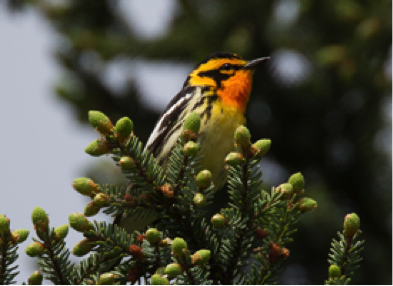I began the Bird Night Flight Calls’ first recording at approximately 12:00 AM on Friday, April 4th on Observatory Hill and it stopped at 3:00 AM on Friday, April 4th. However, upon listening to the three hour recording, I was disheartened to discover that no bird sounds had been recorded, just the shuffling of nocturnal creatures and the leaves blowing in the wind.
After further research into the Monticello Bird Club’s Guide of Charlottesville, I learned that most birds that migrate through Observatory Hill do so between April 15th and May 15th, and of those birds, as many as 15 different species of warblers can be identified.[1] They usually “descend at night and actively feed in the early mornings”.[2] On the contrast, birds that are currently residing in Charlottesville, are diurnal and thus, do not make night calls. Below is a picture of a Blackburnian Warbler and a website which you can hear the recording of the bird.[3] This is a common migratory species found at Observatory Hill in late April:

http://www.allaboutbirds.org/guide/Blackburnian_Warbler/sounds
Warblers, among other migratory species at Observatory Hill, use high frequency calls, which can be heard optimally until five hours after sunset, after which the number of calls heard decreases.[4] Other species of birds commonly found on Observatory Hill that are not migratory, such as Thrushes, are usually found during the summer. Thrushes, for example, project mid-frequency calls that are best heard a couple hours before sunrise.[5] Therefore, it is best to listen to either migratory birds or birds just after sunset and before sunrise which is when our group now plans to record.
[1]Ken Klotz, “Observatory Mountain,” in A Birder’s Guide to Charlottesville, Virginia and Vicinity, May 2003, accessed April 5th, 2014, http://www.monticellobirdclub.org/A%20Birder’s%20Gude%20to%20Charlottesvile%20&%20Vicinity_rev%20June%202009.pdf
[2] Ken Klotz, “Observatory Mountain”
[3] “Blackburnian Warbler,” The Cornell Lab of Ornithology, accessed April 5th, 2014 http://www.allaboutbirds.org/guide/Blackburnian_Warbler/sounds
[4] “Nocturnal Flight Calls and Bird Migration,” Last modified 2013, accessed April 5th, 2014, http://naturebits.org/migration_flight_calls.php
[5] “Nocturnal Flight Calls and Bird Migration”
Post by Emily Votroubek, First-Year